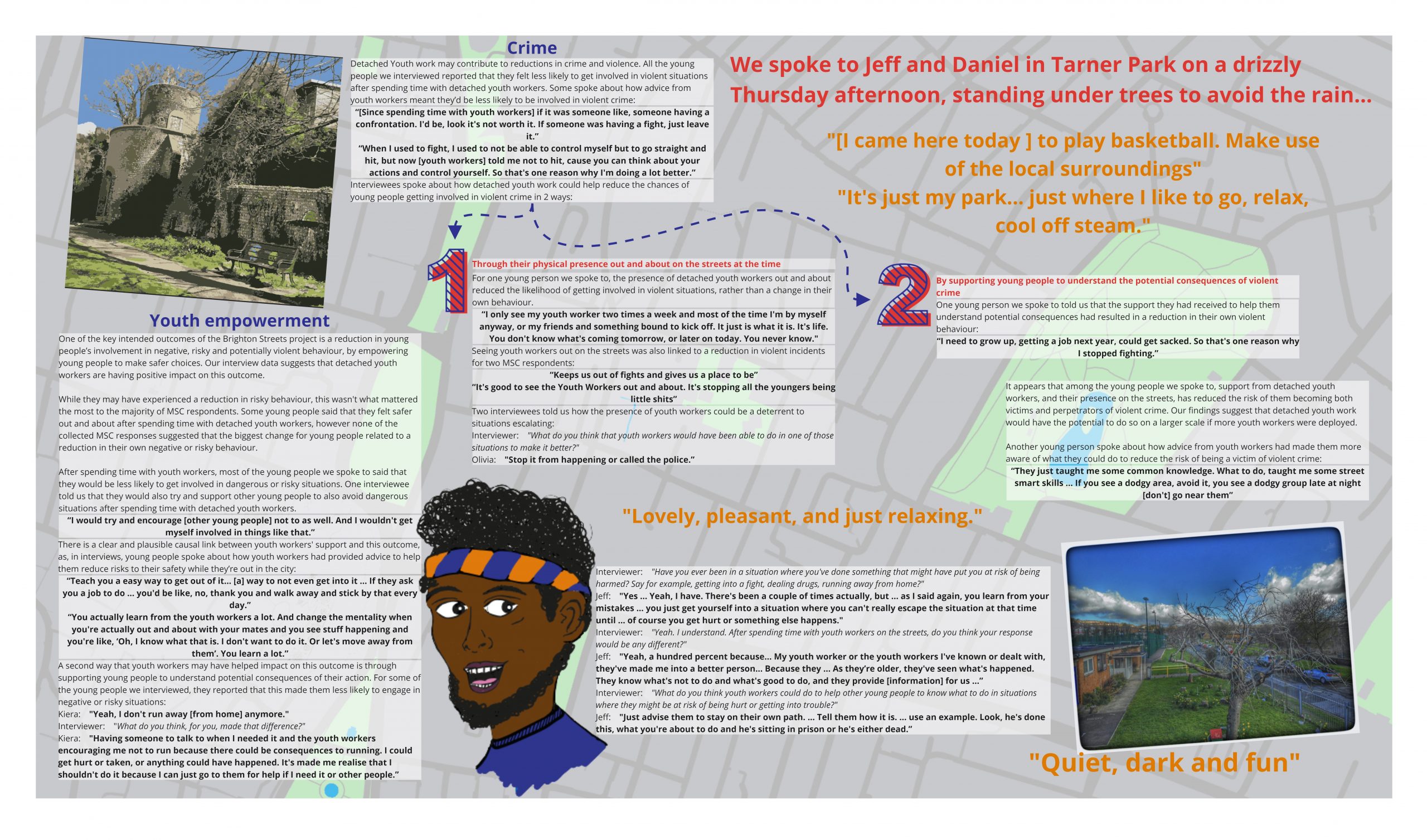
[I came here today ] to play basketball. Make use of the local surroundingsIt’s just my park… just where I like to go, relax, cool off steam.
Lovely, pleasant, and just relaxing.
Quiet, dark and fun
Youth empowerment
One of the key intended outcomes of the Brighton Streets project is a reduction in young people’s involvement in negative, risky and potentially violent behaviour, by empowering young people to make safer choices. Our interview data suggests that detached youth workers are having positive impact on this outcome.
While they may have experienced a reduction in risky behaviour, this wasn’t what mattered the most to the majority of MSC respondents. Some young people said that they felt safer out and about after spending time with detached youth workers, however none of the collected MSC responses suggested that the biggest change for young people related to a reduction in their own negative or risky behaviour.
After spending time with youth workers, most of the young people we spoke to said that they would be less likely to get involved in dangerous or risky situations. One interviewee told us that they would also try and support other young people to also avoid dangerous situations after spending time with detached youth workers.
I would try and encourage [other young people] not to as well. And I wouldn’t get myself involved in things like that.
There is a clear and plausible causal link between youth workers’ support and this outcome, as, in interviews, young people spoke about how youth workers had provided advice to help them reduce risks to their safety while they’re out in the city:
Teach you a easy way to get out of it… [a] way to not even get into it … If they ask you a job to do … you’d be like, no, thank you and walk away and stick by that every day.
You actually learn from the youth workers a lot. And change the mentality when you’re actually out and about with your mates and you see stuff happening and you’re like, ‘Oh, I know what that is. I don’t want to do it. Or let’s move away from them’. You learn a lot.
A second way that youth workers may have helped impact on this outcome is through supporting young people to understand potential consequences of their action. For some of the young people we interviewed, they reported that this made them less likely to engage in negative or risky situations:
Kiera: Yeah, I don’t run away [from home] anymore.
Interviewer: What do you think, for you, made that difference?
Kiera: Having someone to talk to when I needed it and the youth workers encouraging me not to run because there could be consequences to running. I could get hurt or taken, or anything could have happened. It’s made me realise that I shouldn’t do it because I can just go to them for help if I need it or other people.
Interviewer: Have you ever been in a situation where you’ve done something that might have put you at risk of being harmed? Say for example, getting into a fight, dealing drugs, running away from home?
Jeff: Yes … Yeah, I have. There’s been a couple of times actually, but … as I said again, you learn from your mistakes … you just get yourself into a situation where you can’t really escape the situation at that time until … of course you get hurt or something else happens.
Interviewer: Yeah. I understand. After spending time with youth workers on the streets, do you think your response would be any different?
Jeff: Yeah, a hundred percent because… My youth worker or the youth workers I’ve known or dealt with, they’ve made me into a better person… Because they … As they’re older, they’ve seen what’s happened. They know what’s not to do and what’s good to do, and they provide [information] for us …
Interviewer: What do you think youth workers could do to help other young people to know what to do in situations where they might be at risk of being hurt or getting into trouble?
Jeff: Just advise them to stay on their own path. … Tell them how it is. … use an example. Look, he’s done this, what you’re about to do and he’s sitting in prison or he’s either dead.
Crime
Detached Youth work may contribute to reductions in crime and violence. All the young people we interviewed reported that they felt less likely to get involved in violent situations after spending time with detached youth workers. Some spoke about how advice from youth workers meant they’d be less likely to be involved in violent crime:
[Since spending time with youth workers] if it was someone like, someone having a confrontation. I’d be, look it’s not worth it. If someone was having a fight, just leave it.When I used to fight, I used to not be able to control myself but to go straight and hit, but now [youth workers] told me not to hit, cause you can think about your actions and control yourself. So that’s one reason why I’m doing a lot better.
Interviewees spoke about how detached youth work could help reduce the chances of young people getting involved in violent crime in 2 ways:
Firstly, through their physical presence out and about on the streets at the time
For one young person we spoke to, the presence of detached youth workers out and about reduced the likelihood of getting involved in violent situations, rather than a change in their own behaviour.
I only see my youth worker two times a week and most of the time I’m by myself anyway, or with my friends and something’s bound to kick off. It just is what it is. It’s life. You don’t know what’s coming tomorrow, or later on today. You never know.
Seeing youth workers out on the streets was also linked to a reduction in violent incidents for two MSC respondents:
Keeps us out of fights and gives us a place to be
It’s good to see the Youth Workers out and about. It’s stopping all the youngers being little shits
Two interviewees told us how the presence of youth workers could be a deterrent to situations escalating:
Interviewer: What do you think that youth workers would have been able to do in one of those situations to make it better?
Olivia: Stop it from happening or called the police.
Secondly, by supporting young people to understand the potential consequences of violent crime
One young person we spoke to told us that the support they had received to help them understand potential consequences had resulted in a reduction in their own violent behaviour:
I need to grow up, getting a job next year, could get sacked. So that’s one reason why I stopped fighting.
It appears that among the young people we spoke to, support from detached youth workers, and their presence on the streets, has reduced the risk of them becoming both victims and perpetrators of violent crime. Our findings suggest that detached youth work would have the potential to do so on a larger scale if more youth workers were deployed.
Another young person spoke about how advice from youth workers had made them more aware of what they could do to reduce the risk of being a victim of violent crime:
They just taught me some common knowledge. What to do, taught me some street smart skills … If you see a dodgy area, avoid it, you see a dodgy group late at night [don’t] go near them
